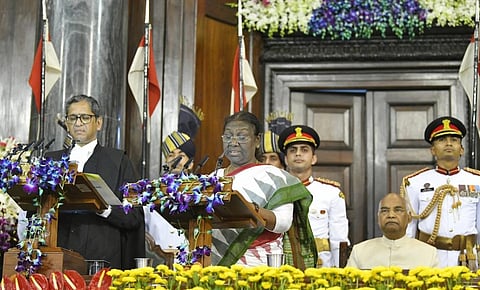Will President Murmu protect tribal and women’s interests? Only time will tell
The election of Droupadi Murmu to the highest office in the country has created a rather unusual debate.
The debate is unusual because past presidential elections have never generated debates about the possibilities of what the incumbent may or may not do while holding the highest constitutional office.
One side of the debate has pointed to how the ideology of the ruling party and its parent wing, the Rashtriya Swayamsevak Sangh may hinder the new President from articulating her tribal identity. This argument rests on the stark paradox India witnessed during the tenure of the last President.
Read
Despite his being from a Dalit background, there were increasing instances ofattacks on marginal castes and lynching of individuals. That example is still fresh in the minds of the people.
Going by the paradox, it is argued that having a tribal person as the President cannot be seen as anything more than mere tokenism. Additionally, social media posts have been focusing on Murmu’s willing acceptance of non-tribal religious practices.
This is circulated as some kind of evidence of her willingness to aid the process of ‘Hinduisation’ of tribals, a thought that upsets the advocates of tribal cultural identity as the foundation of tribal citizenship.
The other side of the argument has been putting forward justification for the choice. A woman, a tribal woman at that for the President’s position, is presented as a statement of Bharatiya Janata Party’s political motto sabka saath, sabka vikas.
Besides, it argued that here is an extremely capable person who rose from the very bottom of the social pyramid and moved from strength to strength in a dignified manner on her own.
Droupadi Murmu has indeed acquitted herself most creditably in all positions she held in the past — as a councilor, a minister, a governor. What, then, is the issue with her being positioned as President? — is the question asked by those who are in favour of the new President.
I have a slightly different view on this matter than either side of the debate. To begin with, it is a great idea to have a woman President. It is an equally great idea to have a tribal person as the President. To have both combined no doubt is a thought to be happy about.
But the question whether she will protect tribal interests and the dignity and rights of women, is something only time will tell. She is not known to have taken a stand against the BJP’s politics and policies in the past. On that ground, to expect her to start questioning the government’s new relaxations in mining licences is a foregone conclusion.
I, however, differ in my assessment of the issue in that humans are full of surprises. If the President has risen from the tribal community and great hardships to this highest position, she surely has her own mind and own aspirations.
If the Prime Minister can do everything to be inscribed in history as unique and unparalleled, an individual holding the President’s office too can have a similar aspiration, particularly so if life’s journey for her or him has been immensely hard.
In our system, the PM is elected as the leader in Parliament by a party that has the people’s mandate. The President is elected differently. And so the power balance is always tilted in favour of the PM.
Yet, if impeachment of the President is a near impossibility, a person holding the office can take statutory steps to safeguard the Constitution. If the already prevalent impression of a PM being authoritarian increases and gains wider currency, a tribal woman as President may come across very differently than all previous Presidents.
She can be the nemesis of an authoritarian regime. Will it be so? Time alone will tell us.
Ganesh Narayan Devy is a critic, thinker, editor, educator and activitist
Views expressed are the author’s own and don’t necessarily reflect those of Down To Earth


